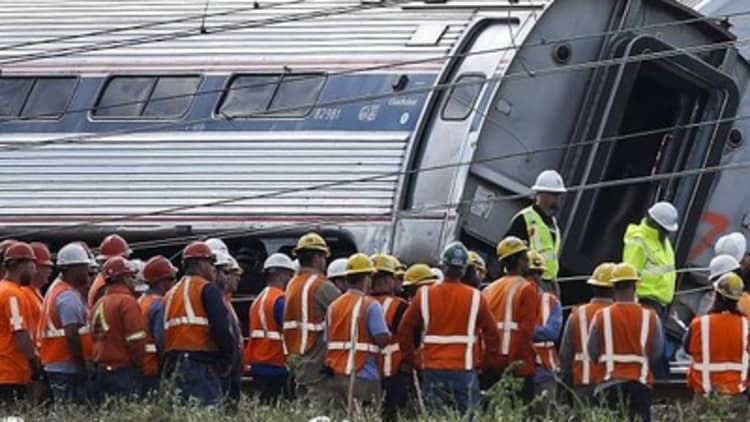The $252 million potentially sliced from Amtrak's budget doesn't just fall within hours of a massive, deadly derailment of one of its passenger trains in Philadelphia.
It also comes as the U.S. posted its fifth-biggest monthly budget surplus in history.
The House of Representatives appropriations committee on Wednesday, in a previously scheduled meeting, rejected a bid to raise Amtrak's capital fund to $1.3 billion. Instead, a funding bill that would reduce Amtrak's capital funding by $252 million from last year's $1.4 billion budget is being marked up.
Budget hawks argue more federal dollars can't be committed to Amtrak without commensurate cuts elsewhere. (Amtrak's safety and operations budgets, under this bill, would separately remain at year-earlier levels.) Indeed, lawmakers are forced by their own automatic spending cuts passed in 2011, at the height of concern over the swelling government deficit.

Quietly, though, America's finances are now improving after years of record deficits dating back to the 2008-09 financial crisis.
The U.S. actually ran a budget surplus of $157 billion in April—its biggest surplus in seven years, and its fifth-largest surplus on record.
To be sure, April is a tax-collection month; it is expected to post the strongest budget inflows.
Even so, this April is a standout. A surging stock market, stronger job gains, and growing corporate profits are all boosting government coffers. Individual taxes, including capital gains, were up 18 percent over April 2014. Gross corporate taxes were up 16 percent. Payroll taxes were up 6 percent.
The annual budget deficit is still high. It's fallen by more than half since the depths of the financial crisis, though, and further improvement may yet be at hand.
"We believe there is the potential for the deficit to be even smaller than estimated in the years to come," said Brian Reynolds, chief market strategist at Rosenblatt Securities.
What Amtrak derailment means for Northeast travel
"Both budget forecasters and bond investors underestimate the swings in capital gains tax revenues stemming from stock market moves," he said. Indeed, he has now developed his own rule of thumb: Capital gains tax revenue tends to rise about a tenth as much (in billions of dollars) as the rose (in points) the year before.
This works both ways: Market declines, as the last major one in 2008-09, also mean magnified declines in capital gains tax revenue.
For now, though, Reynolds believes the stock market will keep appreciating—supported by some of the very consequences of the improving budget.
Stronger tax receipts to states and municipalities will likely be directed towards under-funded public pensions, for example. Pensions are likely to reinvest this income either in the stock market or in corporate credit that itself is often used to fund stock-buybacks or dividends which, yes, support stock-market prices.
Further, many Main Street investors remain under-invested in the stock market. Especially if rates begin to rise, more of their money may also be funneled over time into stocks, which should also support the market's rally.
"I just follow the money," Reynolds said.


